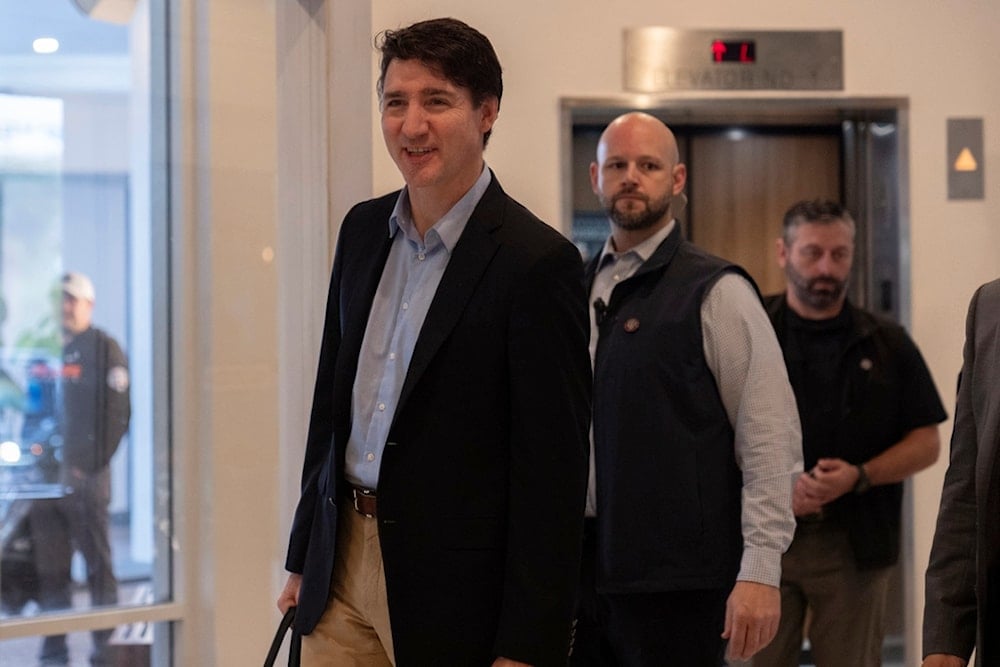Trudeau announces stepping down as Liberal leader after 9-year tenure
Canadian Prime Minister Justin Trudeau steps down from his post as leader of the ruling party after a 9-year tenure.
-

Canada Prime Minister Justin Trudeau walks through the lobby of the Delta Hotel by Marriott, Saturday, November 30, 2024, in West Palm Beach, Florida (AP)
Canadian Prime Minister Justin Trudeau announced on Monday his decision to step down as leader of the ruling Liberal Party after nine years in office. Trudeau stated he would remain in his position until the party selects a new leader, with no election expected before May.
Speaking at a press conference, Trudeau, 53, acknowledged mounting pressure from within the Liberal Party as polls predict a crushing defeat to the opposition Conservatives in the next election. "This country deserves a real choice in the next election, and it has become clear to me that if I'm having to fight internal battles, I cannot be the best option in that election," Trudeau said.
Trudeau, who took office in November 2015 and secured reelection twice, has faced waning popularity over the past two years due to public frustration with rising costs and a housing crisis. Despite his achievements as one of Canada’s longest-serving prime ministers, his political fortunes have steadily declined, with recent polls signaling significant losses for the Liberals regardless of leadership.
To manage the political transition, Trudeau announced that parliament would be suspended until March 24, a move approved by Canada's Governor General, the representative of King Charles III in the country. This delay will push the earliest potential non-confidence motion to May, allowing Trudeau to remain prime minister when US President-elect Donald Trump takes office on January 20.
As Trump received news of Trudeau stepping down, he took to Truth Social to say, "Many people in Canada LOVE being the 51st State. The United States can no longer suffer the massive Trade Deficits and Subsidies that Canada needs to stay afloat. Justin Trudeau knew this, and resigned."
"If Canada merged with the US, there would be no Tariffs, taxes would go way down, and they would be TOTALLY SECURE from the threat of the Russian and Chinese Ships that are constantly surrounding them. Together, what a great Nation it would be!!!" Trump continued.
'Internal battles'
The Liberal Party has faced internal turmoil, including a rift with Finance Minister Chrystia Freeland, who resigned last month after opposing Trudeau’s proposed spending measures. In a critical letter, Freeland accused Trudeau of engaging in "political gimmicks" instead of prioritizing the nation’s welfare.
"Removing me from the equation as the leader who will fight the next election for the Liberal Party should also decrease the level of polarization that we're seeing right now in the House and in Canadian politics," Trudeau stated, emphasizing his intention to refocus the party's efforts.
The Conservatives, led by Pierre Poilievre, are poised to capitalize on the Liberal Party's struggles. Poilievre, a career politician, gained prominence in 2022 for his support of truck drivers protesting COVID-19 vaccine mandates.
Dodging a no-confidence vote?
Trudeau's resignation also comes as Parliament's Public Accounts Committee was set to hold a meeting on January 7 to consider a no-confidence motion against Trudeau’s government.
John Williamson, the panel's Conservative chair, said, "It is now clear that the Liberal government does not have the confidence of parliament."
He has also been abandoned by his Atlantic caucus, which Trudeau's aides saw as critical to the party's chances of winning a fourth term.
The Atlantic Liberals now believe it is in the PM's best interest to quit, feeling he cannot defeat Pierre Poilievre, a populist conservative promising change. They also warn that if Trump follows through on his pledge to impose a 25% tax on all Canadian exports on day one, the country might be thrown into chaos.

 4 Min Read
4 Min Read








